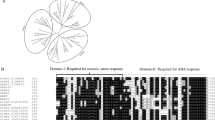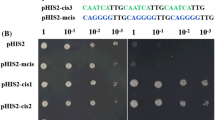Abstract
SOS2-like protein kinases (PKS/CIPK) family genes are known to be involved in various abiotic stresses in plants. Even though, its functions have been well characterized under salt and drought stresses. The roles of PKS genes associated with alkaline stress response are not fully established yet. In this study, we identified 56 PKS family genes which could be mainly classified into three groups in wild soybean (Glycine soja). PKS family genes transcript profiles revealed different expression patterns under alkali stress. Furthermore, we confirmed the regulatory roles of GsPKS24 in response to NaHCO3, pH and ABA treatments. Overexpression of GsPKS24 enhanced plant tolerance to pH stress in Arabidopsis and soybean hairy roots but conferred suppressed pH tolerance in Arabidopsis atpks mutant. Additionally, Overexpression of GsPKS24 decreased the ABA sensitivity compared to Arabidopsis atpks mutant which displayed more sensitivity towards ABA. Moreover, upregulated expression of stress responsive and ABA signal-related genes were detected in GsPKS24 overexpression lines. In conclusion, we identified the wild soybean PKS family genes, and explored the roles of GsPKS24 in positive response to pH stress tolerance, and in alleviation of ABA sensitivity.







Similar content being viewed by others
Data availability
The datasets generated and analyzed during the current study is available from the corresponding authors on reasonable request.
References
Cai X, Jia B, Sun M, Sun X (2022) Insights into the regulation of wild soybean tolerance to salt-alkaline stress. Front Plant Sci 13:1002302. https://doi.org/10.3389/fpls.2022.1002302
Cao L, Yu Y, Ding X, Zhu D, Yang F, Liu B et al (2017) The Glycine soja NAC transcription factor GsNAC019 mediates the regulation of plant alkaline tolerance and ABA sensitivity. Plant Mol Biol 95(3):253–268. https://doi.org/10.1007/s11103-017-0643-3
Chen L, Ren F, Zhou L, Wang QQ, Zhong H, Li XB (2012) The Brassica napus calcineurin B-Like 1/CBL-interacting protein kinase 6 (CBL1/CIPK6) component is involved in the plant response to abiotic stress and ABA signalling. J Exp Bot 63(17):6211–6222. https://doi.org/10.1093/jxb/ers273
Chen K, Li GJ, Bressan RA, Song CP, Zhu JK, Zhao Y (2020) Abscisic acid dynamics, signaling, and functions in plants. J Integr Plant Biol 62(1):25–54. https://doi.org/10.1111/jipb.12899
Clough SJ, Bent AF (1998) Floral dip: a simplified method for Agrobacterium-mediated transformation of Arabidopsis thaliana. Plant J 16(6):735–743. https://doi.org/10.1046/j.1365-313x.1998.00343.x
D’Angelo C, Weinl S, Batistic O, Pandey GK, Cheong YH, Schultke S et al (2006) Alternative complex formation of the Ca-regulated protein kinase CIPK1 controls abscisic acid-dependent and independent stress responses in Arabidopsis. Plant J 48(6):857–872. https://doi.org/10.1111/j.1365-313X.2006.02921.x
Deng X, Zhou S, Hu W, Feng J, Zhang F, Chen L et al (2013) Ectopic expression of wheat TaCIPK14, encoding a calcineurin B-like protein-interacting protein kinase, confers salinity and cold tolerance in tobacco. Physiol Plant 149(3):367–377. https://doi.org/10.1111/ppl.12046
DuanMu H, Wang Y, Bai X, Cheng S, Deyholos MK, Wong GK et al (2015) Wild soybean roots depend on specific transcription factors and oxidation reduction related genesin response to alkaline stress. Funct Integr Genomics 15(6):651–660. https://doi.org/10.1007/s10142-015-0439-y
Finn RD, Coggill P, Eberhardt RY, Eddy SR, Mistry J, Mitchell AL et al (2016) The Pfam protein families database: towards a more sustainable future. Nucleic Acids Res 44(D1):D279-285. https://doi.org/10.1093/nar/gkv1344
Finn RD, Clements J, Eddy SR (2011) HMMER web server: interactive sequence similarity searching. Nucleic Acids Res 39(Web Server issue):W29–W37. https://doi.org/10.1093/nar/gkr367
Fuglsang AT, Guo Y, Cuin TA, Qiu Q, Song C, Kristiansen KA et al (2007) Arabidopsis protein kinase PKS5 inhibits the plasma membrane H+ -ATPase by preventing interaction with 14–3-3 protein. Plant Cell 19(5):1617–1634. https://doi.org/10.1105/tpc.105.035626
Fushimi T, Umeda M, Shimazaki T, Kato A, Toriyama K, Uchimiya H (1994) Nucleotide sequence of a rice cDNA similar to a maize NADP-dependent malic enzyme. Plant Mol Biol 24(6):965–967. https://doi.org/10.1007/BF00014450
Ge Y, Li Y, Zhu YM, Bai X, Lv DK, Guo D et al (2010) Global transcriptome profiling of wild soybean (Glycine soja) roots under NaHCO3 treatment. BMC Plant Biol 10:153. https://doi.org/10.1186/1471-2229-10-153
Ge Y, Li Y, Lv DK, Bai X, Ji W, Cai H et al (2011) Alkaline-stress response in Glycine soja leaf identifies specific transcription factors and ABA-mediated signaling factors. Funct Integr Genomics 11(2):369–379. https://doi.org/10.1007/s10142-010-0191-2
Guo R, Yang Z, Li F, Yan C, Zhong X, Liu Q et al (2015) Comparative metabolic responses and adaptive strategies of wheat (Triticum aestivum) to salt and alkali stress. BMC Plant Biol 15:170. https://doi.org/10.1186/s12870-015-0546-x
Guo R, Shi L, Yan C, Zhong X, Gu F, Liu Q et al (2017) Ionomic and metabolic responses to neutral salt or alkaline salt stresses in maize (Zea mays L.) seedlings. BMC Plant Biol 17(1):41. https://doi.org/10.1186/s12870-017-0994-6
He L, Yang X, Wang L, Zhu L, Zhou T, Deng J et al (2013) Molecular cloning and functional characterization of a novel cotton CBL-interacting protein kinase gene (GhCIPK6) reveals its involvement in multiple abiotic stress tolerance in transgenic plants. Biochem Biophys Res Commun 435(2):209–215. https://doi.org/10.1016/j.bbrc.2013.04.080
Kereszt A, Li D, Indrasumunar A, Nguyen CD, Nontachaiyapoom S, Kinkema M et al (2007) Agrobacterium rhizogenes-mediated transformation of soybean to study root biology. Nat Protoc 2(4):948–952. https://doi.org/10.1038/nprot.2007.141
Ketehouli T, Zhou YG, Dai SY, Carther KFI, Sun DQ, Li Y et al (2021) A soybean calcineurin B-like protein-interacting protein kinase, GmPKS4, regulates plant responses to salt and alkali stresses. J Plant Physiol 256:153331. https://doi.org/10.1016/j.jplph.2020.153331
Kolukisaoglu U, Weinl S, Blazevic D, Batistic O, Kudla J (2004) Calcium sensors and their interacting protein kinases: genomics of the Arabidopsis and rice CBL-CIPK signaling networks. Plant Physiol 134(1):43–58. https://doi.org/10.1104/pp.103.033068
Kumar S, Nei M, Dudley J, Tamura K (2008) MEGA: a biologist-centric software for evolutionary analysis of DNA and protein sequences. Brief Bioinform 9(4):299–306. https://doi.org/10.1093/bib/bbn017
Landi M (2017) Commentary to: “Improving the thiobarbituric acid-reactive-substances assay for estimating lipid peroxidation in plant tissues containing anthocyanin and other interfering compounds” by Hodges et al. Planta (1999) 207:604–611. Planta 245(6):1067. https://doi.org/10.1007/s00425-017-2699-3
Li Z, Tang X, Li J, He Y (2021) Comparative proteomic and transcriptomic analysis reveals high pH-induced expression signatures of Chinese shrimp Fenneropenaeus chinensis. Funct Integr Genomics 21(2):299–311. https://doi.org/10.1007/s10142-021-00779-8
Lin H, Du W, Yang Y, Schumaker KS, Guo Y (2014) A calcium-independent activation of the Arabidopsis SOS2-like protein kinase24 by its interacting SOS3-like calcium binding protein1. Plant Physiol 164(4):2197–2206. https://doi.org/10.1104/pp.113.232272
Lin J, Peng X, Hua X, Sun S, Wang Y, Yan X (2018) Effects of arbuscular mycorrhizal fungi on Leymus chinensis seedlings under salt-alkali stress and nitrogen deposition conditions: from osmotic adjustment and ion balance. RSC Adv 8(26):14500–14509. https://doi.org/10.1039/c8ra00721g
Liu J, Guo Y (2011) The alkaline tolerance in Arabidopsis requires stabilizing microfilament partially through inactivation of PKS5 kinase. J Genet Genomics 38(7):307–313. https://doi.org/10.1016/j.jgg.2011.05.006
Liu A, Yu Y, Duan X, Sun X, Duanmu H, Zhu Y (2015) GsSKP21, a Glycine soja S-phase kinase-associated protein, mediates the regulation of plant alkaline tolerance and ABA sensitivity. Plant Mol Biol 87(1–2):111–124. https://doi.org/10.1007/s11103-014-0264-z
Lu L, Wu X, Wang P, Zhu L, Liu Y, Tang Y et al (2022) Halophyte Nitraria billardieri CIPK25 mitigates salinity-induced cell damage by alleviating H(2)O(2) accumulation. Front Plant Sci 13:961651. https://doi.org/10.3389/fpls.2022.961651
Luan S (2009) The CBL-CIPK network in plant calcium signaling. Trends Plant Sci 14(1):37–42. https://doi.org/10.1016/j.tplants.2008.10.005
Luo Q, Feng J, Yang G, He G (2022) Functional characterization of BdCIPK31 in plant response to potassium deficiency stress. Plant Physiol Biochem 192:243–251. https://doi.org/10.1016/j.plaphy.2022.10.014
Ma R, Liu W, Li S, Zhu X, Yang J, Zhang N et al (2021) Genome-wide identification, characterization and expression analysis of the CIPK gene family in potato (Solanum tuberosum L.) and the role of StCIPK10 in response to drought and osmotic stress. Int J Mol Sci 22(24):13535. https://doi.org/10.3390/ijms222413535
Nisa ZU, Wang Y, Ali N, Chen C, Zhang X, Jin X et al (2023) Strigolactone signaling gene from soybean GmMAX2a enhances the drought and salt-alkaline resistance in Arabidopsis via regulating transcriptional profiles of stress-related genes. Funct Integr Genomics 23(3):216. https://doi.org/10.1007/s10142-023-01151-8
Paul A, Kumar S (2011) Responses to winter dormancy, temperature, and plant hormones share gene networks. Funct Integr Genomics 11(4):659–664. https://doi.org/10.1007/s10142-011-0233-4
Rao Y, Peng T, Xue S (2023) Mechanisms of plant saline-alkaline tolerance. J Plant Physiol 281:153916. https://doi.org/10.1016/j.jplph.2023.153916
Ren W, Zhang J, He J, Fang J, Wan L (2022) Identification, expression, and association analysis of calcineurin B-like protein-interacting protein kinase genes in peanut. Front Genet 13:939255. https://doi.org/10.3389/fgene.2022.939255
Saeed AI, Bhagabati NK, Braisted JC, Liang W, Sharov V, Howe EA et al (2006) TM4 microarray software suite. Methods Enzymol 411:134–193. https://doi.org/10.1016/S0076-6879(06)11009-5
Sanyal SK, Rao S, Mishra LK, Sharma M, Pandey GK (2016) Plant Stress Responses Mediated by CBL-CIPK Phosphorylation Network. Enzymes 40:31–64. https://doi.org/10.1016/bs.enz.2016.08.002
Schmutz J, Cannon SB, Schlueter J, Ma J, Mitros T, Nelson W et al (2010) Genome sequence of the palaeopolyploid soybean. Nature 463(7278):178–183. https://doi.org/10.1038/nature08670
Sozgen Baskan K, Tutem E, Ozer N, Apak R (2013) Spectrophotometric and chromatographic assessment of contributions of carotenoids and chlorophylls to the total antioxidant capacities of plant foods. J Agric Food Chem 61(47):11371–11381. https://doi.org/10.1021/jf403356h
Xiang Y, Huang Y, Xiong L (2007) Characterization of stress-responsive CIPK genes in rice for stress tolerance improvement. Plant Physiol 144(3):1416–1428. https://doi.org/10.1104/pp.107.101295
Xu M, Li H, Liu ZN, Wang XH, Xu P, Dai SJ et al (2021) The soybean CBL-interacting protein kinase, GmCIPK2, positively regulates drought tolerance and ABA signaling. Plant Physiol Biochem 167:980–989. https://doi.org/10.1016/j.plaphy.2021.09.026
Yang M, Yarra R, Zhang R, Zhou L, Jin L, Martin JJJ et al (2022) Transcriptome analysis of oil palm pistil during pollination and fertilization to unravel the role of phytohormone biosynthesis and signaling genes. Funct Integr Genomics 22(2):261–278. https://doi.org/10.1007/s10142-022-00834-y
Yu Q, An L, Li W (2014) The CBL-CIPK network mediates different signaling pathways in plants. Plant Cell Rep 33(2):203–214. https://doi.org/10.1007/s00299-013-1507-1
Zhu JK (2016) Abiotic Stress Signaling and Responses in Plants. Cell 167(2):313–324. https://doi.org/10.1016/j.cell.2016.08.029
Acknowledgements
The authors would like to thank Researchers Supporting Project number (RSP2023R118), King Saud University, Riyadh, Saudi Arabia. The authors thank the Heilongjiang Provincial Academy of Agricultural Sciences for providing soybean seeds.
Funding
This work was supported by the Natural and Science Foundation of China (grant number 32001454), Natural Science Foundation of Heilongjiang Province (grant number YQ2023C034) and Researchers Supporting Project number (grant number RSP2023R118), King Saud University.
Author information
Authors and Affiliations
Contributions
XM, DD and CC performed the experiment, analyzed data; DD and CC wrote the manuscript; JW and ZN edited the manuscript; HE, LJ, CC and XJ provided ideas, designed the research; all authors read and approved the final manuscript.
Corresponding author
Ethics declarations
Ethics approval and consent to participate
Experimental research and field studies on plants including the collection of plant material are in comply with relevant guidelines and regulation.
Consent for publication
Not applicable.
Competing interests
The authors declare that they have no competing interests.
Additional information
Publisher's note
Springer Nature remains neutral with regard to jurisdictional claims in published maps and institutional affiliations.
Supplementary Information
Below is the link to the electronic supplementary material.
Rights and permissions
Springer Nature or its licensor (e.g. a society or other partner) holds exclusive rights to this article under a publishing agreement with the author(s) or other rightsholder(s); author self-archiving of the accepted manuscript version of this article is solely governed by the terms of such publishing agreement and applicable law.
About this article
Cite this article
Ding, D., Mi, X., Wu, J. et al. GsPKS24, a calcineurin B-like protein-interacting protein kinase gene from Glycine soja, positively regulates tolerance to pH stress and ABA signal transduction. Funct Integr Genomics 23, 276 (2023). https://doi.org/10.1007/s10142-023-01213-x
Received:
Revised:
Accepted:
Published:
DOI: https://doi.org/10.1007/s10142-023-01213-x




